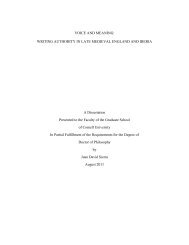Briana Anderson - Cornell University
Briana Anderson - Cornell University
Briana Anderson - Cornell University
You also want an ePaper? Increase the reach of your titles
YUMPU automatically turns print PDFs into web optimized ePapers that Google loves.
marketing, a person’s attractiveness will lead to greater perceptions of credibility<br />
71<br />
when the product being marketed is related to beauty.<br />
With regard to personal involvement, the findings of this study did support not<br />
H3, that is, the findings did not indicate that high involvement levels lead people to<br />
rely on attractiveness less. In fact, those people with high involvement gave overall<br />
higher endorser credibility scores (perhaps due to their personal connection with breast<br />
cancer) and tended to view attractiveness as taking away from expertise and<br />
trustworthiness. In essence, those with high involvement made greater judgments<br />
rather than less, which contradicts theories of involvement such as ELM, which would<br />
predict that those with greater involvement would rely less on heuristics such as<br />
attractiveness to make a judgment. As stated in the limitation section, my<br />
conceptualization and measurement of involvement differed from ELM advertising<br />
study conceptualizations and that may account for the difference.<br />
The point of a corporate social responsibility message is to create a trusting<br />
relationship of an organization with its publics and to convince the public that the<br />
organization is interested in contributing to the well being of society. This is a very<br />
different goal than simply selling a product. In this case, merely a pretty face may not<br />
lead to attributions of trustworthiness and expertise found in marketing and advertising<br />
research.<br />
For industry, this study has several important findings and raises a number of<br />
considerations for public relations and/or marketing decision-makers when launching<br />
a corporate social responsibility or social marketing campaign. First, when choosing<br />
an endorser, the decision-maker should consider whether or not an external vs. internal<br />
endorser would be more credible. This could vary depending on who the audience of<br />
the campaign is – consumers, stockholders, employees, etc. Another important factor<br />
is whether or not the person (if a known individual) has an already-established positive

















